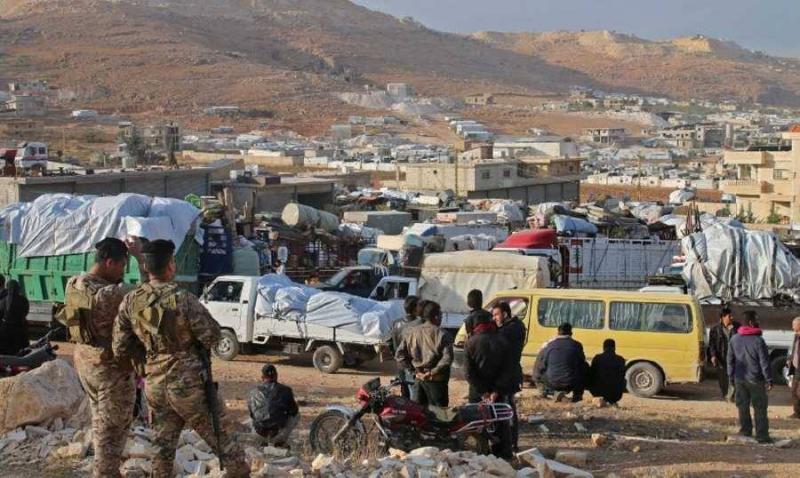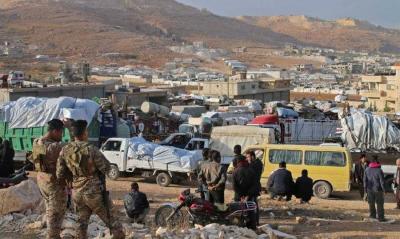The issue of Syrian refugees has resurfaced in Lebanon following the murder of Lebanese Forces official Pascal Sleiman in Jbeil, with Syrians suspected of involvement in the crime and later transporting his body into Syria after he was kidnapped by a gang last Sunday. This crisis has dominated the public discourse as details emerged regarding the crime and the gang, which is largely composed of Syrians, according to official accounts.
Videos circulated on social media have shown Syrian refugees being subjected to assaults by angry locals. In response, Interior Minister Bassam Mawlawi called after a Central Security Council meeting for "more restrictions on Syrian refugees," emphasizing that the Syrian presence "should be limited." The United Nations High Commissioner for Refugees (UNHCR) confirmed they had received reports of multiple attacks on Syrian individuals and are monitoring their situation based on their individual cases reported as experiencing violence or abuse.
The UNHCR reiterated its call for the Lebanese government and authorities "to maintain calm and exercise restraint during the already tense security situation in Lebanon." They stated, "We understand the deep sorrow and anger many are feeling during this tragic time. It is important to limit resorting to such attacks and instead allow for the continuation of investigations (into the killing of the Lebanese official) and the gathering of more information." They stressed that no acts of retaliation or collective punishment resulting from self-security should be tolerated.
Regarding the municipalities and the expulsion of refugees, George Krikorian, a member of the Burj Hammoud municipality, clarified that the municipality does not have the legal authority to expel any refugee within its geographical area but mentioned that it takes actions within its competencies after notifying the relevant authorities and security forces. He also pointed out in statements to Al-Arabiya that the municipality requested all property owners in Burj Hammoud to verify the legitimacy of any Syrian refugee's documents before allowing them to work or sign rental agreements registered with the municipality.
Krikorian stated that "as a municipality, we have not received any instructions from the relevant authorities regarding new measures affecting the Syrian presence in our area, and we continue to operate according to previous guidelines concerning the verification of documents for each refugee and ensuring their residency permits." He added that in cases of doubt, they notify the security forces to take action.
He highlighted that "there are no accurate and official figures on the number of Syrian refugees within Burj Hammoud," noting, "recently we have conducted raids in cooperation with security forces to regulate the Syrian presence in our area."
In Jbeil, Mayor Wissam Zaarour told Al-Arabiya.net that the municipality had already taken measures to regulate the Syrian presence. However, he noted that following the incident of Sleiman's murder, additional steps would be taken to tighten regulations regarding Syrian-run businesses and ensure legal compliance in cooperation with the relevant authorities, specifically the ministries of labor and economy. He disclosed that there are around 5,000 Syrian refugees within the Jbeil municipality, adding that a new information system has been established to track each refugee's identity, workplace, and residence.
Similar to Burj Hammoud, Zaarour mentioned that the Jbeil municipality does not have the authority to expel any Syrian refugees but can only notify the relevant authorities to act on any suspicious activities. Furthermore, he expressed concern over the potential for a repeat of the scenario following Pascal Sleiman's murder and the resultant angry reactions.
In a separate statement, Abdo Haj, the mayor of Zouk Mikhael (Mount Lebanon), told Al-Arabiya.net that the municipality's measures regarding Syrian refugees have not changed due to the murder of the Lebanese official. He mentioned, "We still prohibit nighttime movement while checking the legal documents of each refugee through checkpoints organized by municipal police at night." He emphasized, "As a municipality, we are fulfilling our duties regarding the regulation of the Syrian presence, particularly scrutinizing rental agreements; however, unfortunately, some Lebanese, driven by the pursuit of 'fresh dollars,' enter rental agreements with refugees and Syrian families without informing or registering with us legally to evade municipal fees, leading to chaos." He noted, "The state has tossed the hot potato of the refugee issue into the hands of municipalities without sharing its responsibility in this regard; nonetheless, we are fulfilling our obligations within our jurisdictions and financial capabilities while coordinating with security forces."




